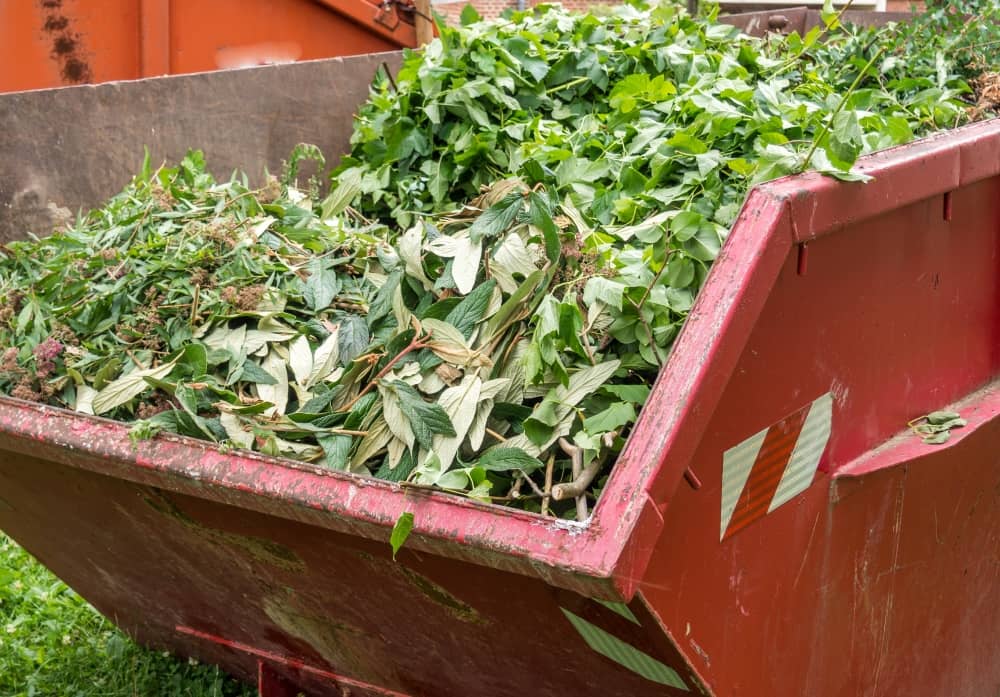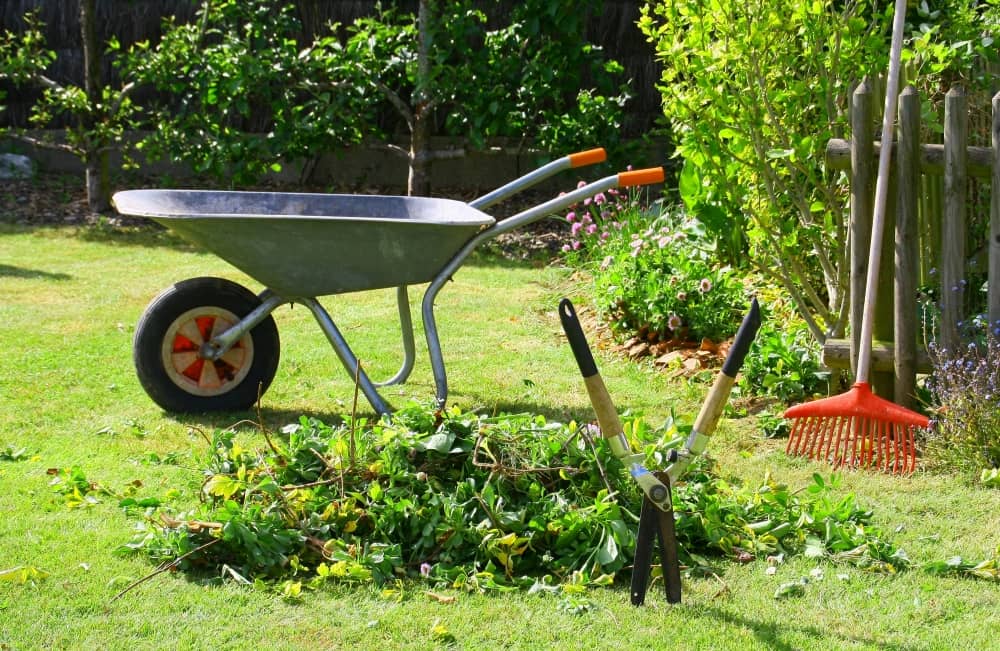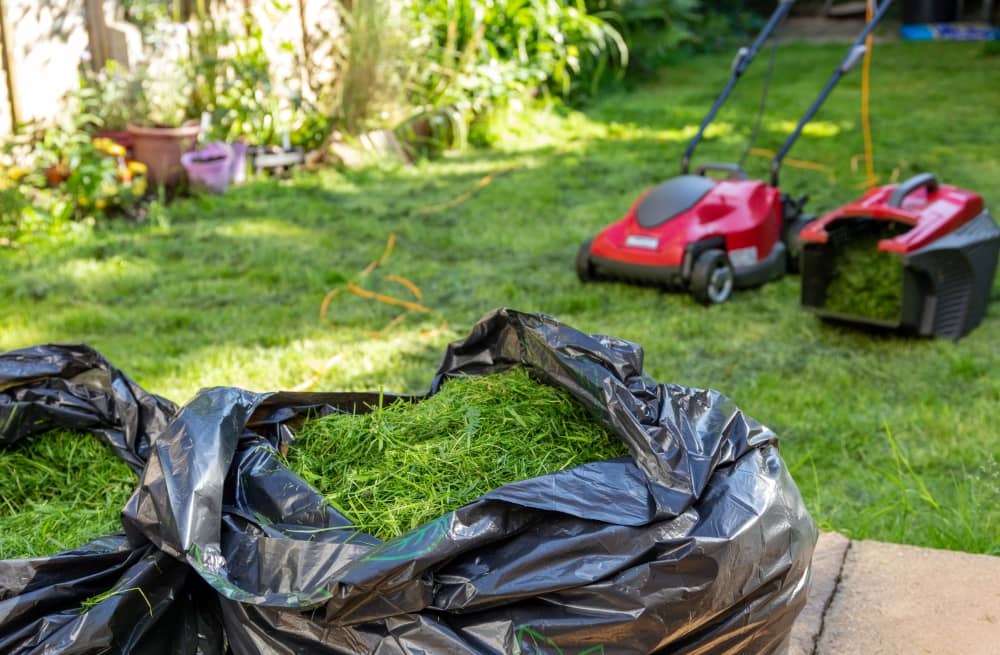
Last Updated 14 November 2024
Your garden is your pride and joy. Unfortunately, it often comes with responsibilities to maintain its beauty. Part of the maintenance is to manage green waste. It may not sound much, but the waste you frequently generate can be quite a task.
But what is green waste exactly?
You may have done some gardening work here and there. All waste produced whilst trying to maintain your flourishing flora is called garden or green waste.
It is a myth that everything from your garden can be tossed directly in your green waste bin. But don’t worry; it’s pretty straightforward to distinguish the various types of waste you can find in your garden, which typically fall into two categories:
- Organic Waste: Lawn clippings, twigs, weeds, leaves, flowers, hedge trimmings
- Solid Rubbish: Pots, ceramics, seed trays, glass, old garden tools
Any compostable refuse can go to green waste bins. Aside from the organic waste above, other examples include floral arrangements, loose bark, chopped trees, and even your old Christmas tree.
Why Should You Care about Getting Rid of Garden Waste?
Many people don’t give a second thought about their green waste once it’s in landfills. However, if you don’t put in green waste bins where the rubbish should be, it can lead to long-term consequences, such as:
- No-Oxygen Decomposition: Unsegregated green waste ends up in mountains of household landfills. Rubbish from your house is generally sealed in a tight barrier devoid of oxygen. That means green waste will not break down correctly because it requires oxygen to decompose.
- Harmful Gas and Liquid Production: Anaerobic microorganisms take control of decomposition due to the absence of oxygen. The process is slow and gives off a foul odour. Not only that, it pollutes the air with greenhouse gas emissions and leachate. This liquid contains inorganic chemicals that increase human health risks.
- Environmental Pollution: As mentioned, leachate is produced when disposing of garden waste is done incorrectly. Before its release, leachate settles first and is often removed using wastewater. However, it can pollute the waterways if not appropriately contained, which effectively degrades the flora and food of the local fauna.
How to Dispose of Garden Waste
Before learning about the proper disposal of garden waste, the first step is segregating green waste from brown waste. It can get a little confusing, but this step is necessary. Green waste is high in nitrogen, whilst brown waste is primarily carbonaceous. Therefore, you cannot simply mix green and brown waste, including sawdust, twigs, dried leaves, hay, and pine needles.
Apart from brown waste, garden chemicals should not be combined with garden waste. We’re talking about pesticides, fertilisers, and herbicides. Also, make sure to separate bricks, rocks, sand, treated wood, and other similar waste from your garden rubbish.
When everything has been sorted, we recommend that you have a green waste bin ready. Hire a green waste skip bin for hassle-free disposal of garden waste right on your property. Pick the right bin size so you do not end up with less or too much space than needed.
But here comes the tricky part. You can’t just put every piece of rubbish in green waste bins. Therefore, it’s essential to know what you can and can’t throw in the bin. In general, you can put anything that decomposes, such as:
- Prunings
- Grass cuttings
- Flowers, leaves, weeds, and plants
- Fruits and vegetables
- Hedge and lawn clippings
- Smaller twigs
You should NEVER place the following in a green waste bin unless specified by the skip bin provider:
- Cat and dog litter
- Glass
- Plastic
- Food
- Medical waste
- Needles
- Hazardous waste (cleaners, acids, petrol, poisons, etc.)
- General rubbish
To avoid mistakes in garden waste disposal, it helps to talk and ask questions before you hire a skip. Here at Backyard Bins, we accept all garden waste, including soil, making us the perfect choice for those that underwent garden renovations.
Benefits of Using Skip Bins for Green Waste Disposal
When it comes to managing green waste, skip bins provide a hassle-free, efficient solution, particularly for homeowners with large garden projects or seasonal clean-ups. Unlike smaller disposal options, skip bins can handle substantial amounts of waste, making them perfect for clearing out everything from branches and leaves to grass clippings in one go.
Skip bins are also incredibly convenient. With various sizes available, you can choose one that suits the scale of your project, whether it’s a small garden tidy-up or a major landscaping overhaul. Plus, many skip bin providers offer flexible delivery and pick-up services, allowing you to fill the bin at your own pace. This convenience saves you multiple trips to disposal facilities and helps you manage green waste responsibly without cluttering up your garden.
Using a skip bin for green waste doesn’t just make garden maintenance easier—it’s an environmentally friendly choice too, as skip bin companies often sort and recycle waste where possible.
Other Options on Where to Take Your Garden Waste
You do not have to rely entirely on green waste bins to keep your garden clean and organised. Here are other ways:
- Composting: You do not have to wonder where to take the garden waste because the process takes place right in your yard. All you need to do is to mix the leaves, weeds, grass, and other decomposing materials in your compost bin. Then, you wait for the composting magic to happen. The beauty of this process is that you can use the compost you created for next season’s garden beds.
- Vermicomposting: A similar composting method, vermicomposting quickens the process of composting using worms. It can be done in a small container and can even be used in breaking down food waste.
- Proper Lawn Care: You can effectively reduce your responsibilities by being a responsible gardener in the first place. Take the necessary steps to prevent more work, such as mowing the lawn regularly to restrict extreme weed and grass growth. If you’re planning to plant more, choose suitable species, such as those that do not go through massive leaf loss. These small steps can significantly decrease waste production and, therefore, reduce the need for more yard work.
- Grasscycling: When you cut grass, you leave the clippings to create mulch. This is known as grasscycling, a process that helps give the rest of the garden the necessary nutrients.
The Waste Authority has a Waste Avoidance and Resource Recovery Strategy Action Plan that all Western Australians can and should participate in. This plan prioritises specific steps to improve waste disposal, education, and innovation. That way, residents and businesses will understand the best ways how to get rid of garden waste, as well as other types of rubbish.
Be a part of this plan by actively disposing of your garden waste properly. Hire a skip bin for your garden waste today.
Backyard Bins Team
“ [rcblock id="2165"]”

